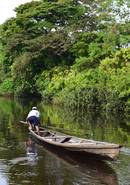News

The Paris Agreement requires individual countries to reduce emissions through climate action plans, known as Nationally Determined Contributions (NDCs). A number of NDCs include measures to reduce deforestation and forest degradation, which can also be implemented outside the forestry sector. These include actions such as investing in sustainable, inclusive and productive agricultural development, agroforestry, rural finance, and in managing natural resources more sustainably. The area of policy and legal reforms is one example where cross-sectoral collaboration is fundamental.
In Peru, strategic land-use planning frameworks are vital to the harmonisation of agricultural, mining, forest and other land uses in the regions, according...

We are pleased to invite you to
Digital Summit "Peatlands – A landscape to discover"
Date: Thursday 4 October 2018
Time: 12:00 - 13:30 CEST (Use this tool to convert to your local time zone)
Registration: on the webinar webpage
Confirmed panelists
Benjamin Toirambe Bamoninga, Secretary-General ai, Ministry of Environment and Sustainable Development, the Democratic Republic of the Congo
Francis Müller, Director of Pôle-relais tourbières à la Fédération des Conservatoires d’espaces naturels, France
Ifo Suspense, Marien Ngouabi University, Republic of Congo
Facilitator: Anne Branthomme and Maria Nuutinen, FAO
This Digital Summit will be conducted online in French.
Peatlands – A landscape to discover
Peatlands are one of the least understood and monitored...

Under the common theme “From REDD+ Readiness to Implementation and Results: FAO’s support to countries”, a set of flyers was recently published by FAO. The flyers aim to facilitate countries’ reflection and decision-making on how to plan and implement actions to reduce emissions from deforestation and forest degradation.
The Paris Agreement provides a landmark global commitment to tackle one of the biggest challenges of our time: to keep global average temperature below 2 degrees Celsius above pre-industrial levels. Country commitments are reflected in their Nationally Determined Contributions (NDCs); REDD+ appears in many of them as a prominent component of the fight...

Supported by FAO and the Government of Canada, the project aims to contribute to the sustainable use of forest resources and reduce greenhouse gas emissions
On 9 August 2018, a new project was launched to promote conservation and the responsible use of the forests of Honduras and to reduce deforestation and greenhouse gas emissions in the country. The project will work with women as well as rural and indigenous youth from 12 municipalities in the Western region of the country, in the districts of Lempira and Santa Bárbara.
According to the Forest Reference Emission Level submitted by Honduras to the United Nations Framework Convention on...

On 23 July, journalists from 10 Latin American countries arrived in Colombia for a 4-day media workshop. Organised by the UN-REDD Programme with support from LatinClima, the media trip brought together journalists and media experts as a contribution to the ongoing international debate about the importance of tropical forests for climate change mitigation actions. The goal was to advance participants’ understanding of the importance of community-led REDD+ actions by exposing them to the real-life example of the COCOMASUR Community who recently developed the first REDD+ conservation project in Colombia that generated carbon credits for protecting the forest in a collective...

